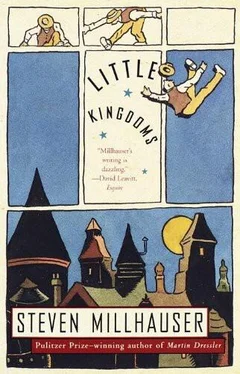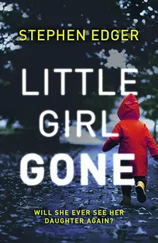One hot night toward the end of August, when heat lightning flickered in the blue-black sky and the chirr of crickets through the adjustable screen sounded like the tense hum of electric wires, Franklin placed a pen in his box of penholders, screwed the cap onto his bottle of drawing ink, and sat back in his leather desk-chair with his arms hanging heavily over the sides. The lacy black hands of the glass-covered clock showed 12:55. He was tired; the front of his neck felt wet; the back of his shiny brown vest stuck against the leather chairback. Everything was still, as still as in his father’s darkroom when the enlarger light clicked on and shone down through the negative onto the magic paper. His father had counted slowly, in a grave voice, marking each number by the slow downward motion of his index finger, reddish in the light of the darkroom lamp. The enlarger light clicked off; the cream-colored paper, empty of images but charged now with secret life, slipped into the developer tray; he was allowed to hold it under with the tongs. He watched very closely in the light of the red lamp. Now in the white paper a shadow appeared, and another, a hardening edge, a hazy foot, a face, a tree — and there he was, darkening, smiling up at himself in the developer tray, as clear as life, but motionless, hardening: spellbound. And as he grasped the edge of paper carefully with the tongs in order to lift it from the developer into the stop bath, in his mind he saw the boy in the photograph walking across the picture, one foot after the other, through trembling spots of sun and shade. And he had done it; now he had done it; and scraping back carefully in his desk chair, Franklin began pacing about the room, his heart beating wildly, and in his temples a ripple of headache. He had done it, and he needed to tell his father. But his father was dead. What did it mean? The clock tick-tocked. Hearts ran down and you couldn’t wind them up again. Time was passing — even here. Franklin, filled with exhilaration and a kind of wild melancholy, stepped to the door of the tower room. He began to hurry — quietly, quietly — down the stairs.
At Cora’s door he stopped and placed his hand on the fluted glass knob. The handle squeaked as it turned; through a sliver of door-opening he saw Cora asleep on her back, her head turned to one side. Heat lightning flickered beyond the screen, showing a glimmer of branches. “Cora,” he whispered; he heard the gentle rasp of her breathing, a racket of crickets. Quietly he closed the door. He made his way down the hall and placed his hand on another fluted glass knob. The door opened with a squeak: he would have to remember to oil the bottom hinge. Stella lay on her side in a wildness of bedclothes. Franklin knelt by the bed. “Stella,” he whispered, “are you awake? Stella.” He shook her shoulder. She opened her eyes and looked at him gravely. “Stella,” he whispered, “I just wanted to tell you: I’m done. Now go back to sleep.”
Stella sat up and gave a shuddering yawn. A ripple of slepton hair fell across her cheek and touched the corner of her yawning mouth; she swept it back as if she were brushing at a fly. Then she pulled up a shoulder of her short-sleeved nightshirt, which slipped down again, and held out her thin arms. “Carry me,” she said, and reached quickly for her bear.
Franklin carried her up the stairs to his tower study. On the floor he sat with her on his lap and turned the handle of his viewing machine. In the department store at midnight, the toys woke to life. The nightmare flight through a world of giant furniture, the revolving door, the menacing subway ride, the looming buildings, the night storm — all was calculated to make the doll smaller and smaller until, in the candy store, came the turn: then larger and larger she grew, as the scrupulously reduced world grew smaller and smaller, and at last she straddled Manhattan. The coda was swift: the return to her proper size, the flight back to the department store, the stiffening of the toys as the city woke from its dream. It had taken him seventeen months. He had seen it all a hundred times, five hundred times, his back ached and his temples were throbbing, but he knew that nothing like it had ever been done before. He glanced down. Stella, faithful and exhausted, was asleep in his lap. Her one-eyed bear lay on his back on the floor. “Thank you,” Franklin whispered. “Sorry,” he whispered. “Easy does it,” Franklin said, scooping them both up in his arms as joy leaped in him and headache, like heat lightning, flickered across the back of his brain.
In the arcade building , cool and shadowy after the hot sunlight of the avenue, Franklin passed a flower shop, a cigar store, a shoemaker’s shop where a sad-eyed man in a leather apron sat staring at an upside-down red high-heeled shoe, a newsstand, and a barbershop where a man lay with a towel over his face. Franklin wondered whether it was the same man the barber had murdered almost three years ago. Next came an archway that contained a dim-lit staircase with a rattly handrail. At the top of the dark stairs he entered the Vivograph studio, where he was told that Max had gone down for his morning shave. In the barbershop, empty except for the man with the towel over his face and a barber shaking out an apron, Franklin was surprised that he hadn’t recognized Max, though even now there was something a little unfamiliar about the look of his legs and the shiny black leather shoes. He sat down in the barber chair next to Max and leaned back against the adjustable neck-rest as a second barber rose heavily from a chair in the corner. To the soothing sound of the blade slapping against the strop — the swing of the blade and the steady slap-slap reminded him of the pendulum in the glass-cased clock — Franklin closed his eyes and settled into the soft leather seat. “I’m done,” he said to Max. “Twelve thousand three hundred twenty-four drawings — over twelve minutes. I want Vivograph to shoot it. I wonder whether I can screen it early next week? Do you do this every day?” The barber began lathering his cheeks; the warm thick soap, the soft bristles of the brush, the smell of scented oils, the barber’s firm plump stomach pressing against his elbow, all this soothed him deeply. He was very tired. “Max,” he said quietly, “are you asleep?” He opened his eyes and glanced at Max as the first barber leaned over and slowly removed the towel. He saw flushed red cheeks, bristly gray eyebrows, and a pencil-line gray mustache. “So there you are,” called a familiar voice, and Max strode into the barbershop. “They told me I’d find you here. I had to pick up a few things.” He sat down in the empty chair on the other side of Franklin. “So what brings you to my neck of the woods? Give him the spray job, Benny. Make a new man of him. Irwin, I’d like you to meet Franklin Payne: friend of mine. Irwin Marcus.” Still leaning back in the barber chair, the man with brick-red cheeks and a gray mustache solemnly extended a hand.
In a booth in an arcade coffee shop Max agreed to photograph the drawings, which sat in twelve cartons in the trunk of Franklin’s Packard; he had driven into the city and parked around the corner from the arcade building. Two young men from Vivograph, with identical vests and four white shirt-sleeves rolled up above the elbows, helped Max and Franklin carry up the boxes and set them on the floor of Max’s small office. Franklin eyed the growing pile ruefully. Individual drawings flashed in his mind, but he could not put them together. They were lifeless — boxes of corpses. He had wasted a year and a half of his life. “Don’t worry,” Max said, “I’ll guard them with my life,” and as Franklin stepped past the flower shop into hot sunshine, he was so startled by the loud car horns, the explosion of jackhammers, the flash of sun on black and red and green cars, the reflections of striding people in plate-glass windows, the sharp smell of gasoline and baked cookies, that his visit to Max seemed to have taken place under the ground, in a dark burrow, long ago, in some other life.
Читать дальше












